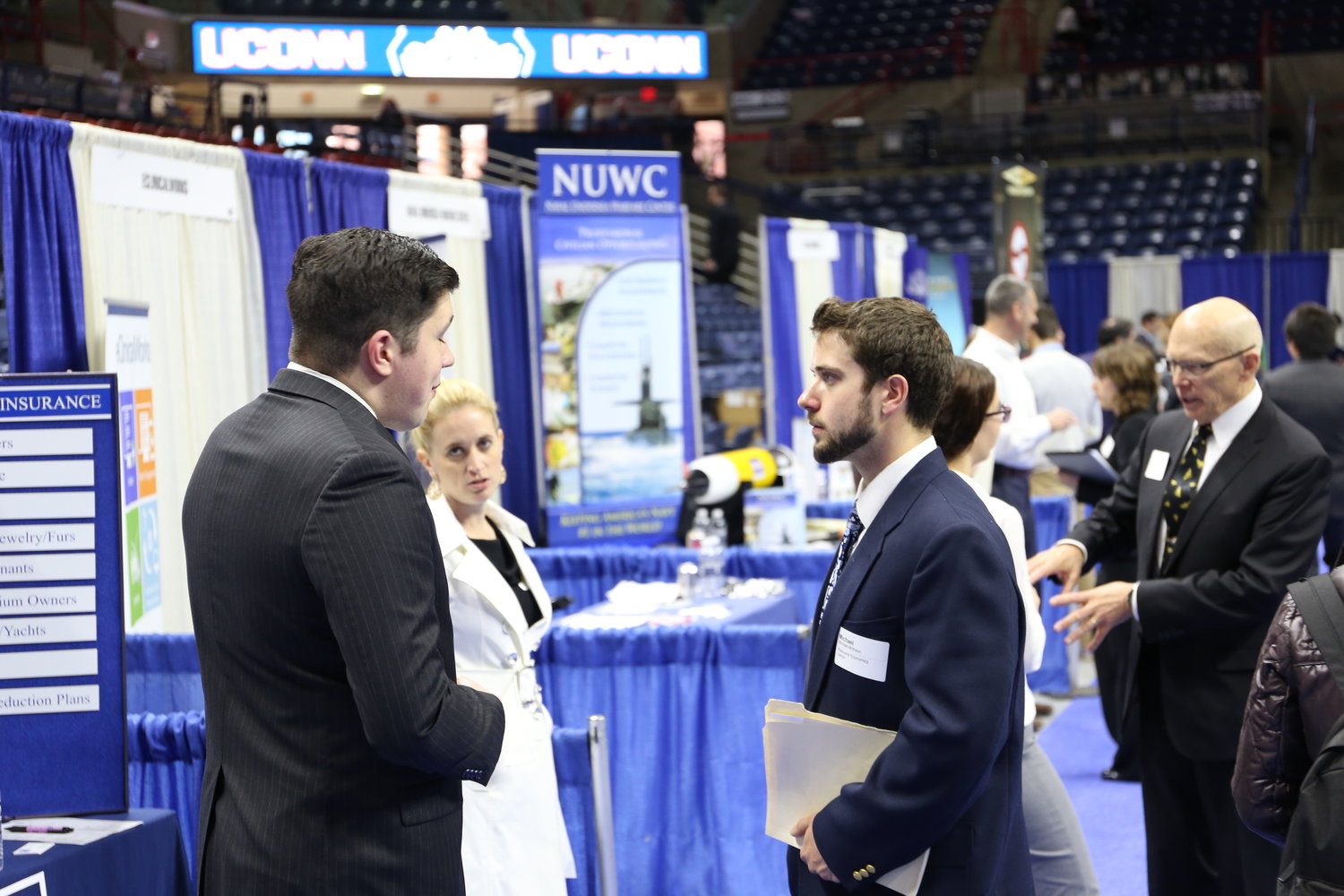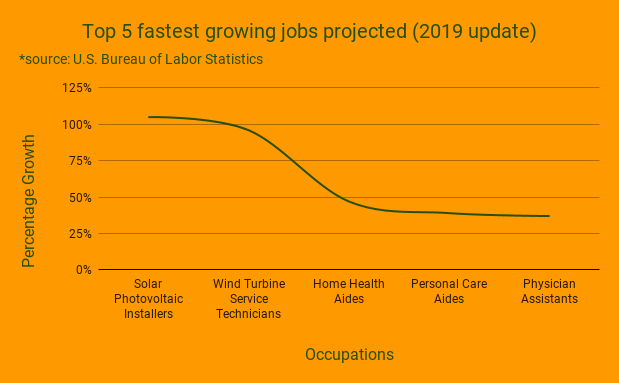The First Step: Seeking Employment
Tama Moni
The Daily Campus
Oct. 17, 2017
STORRS, Conn.—Back to college means back to homework, studying for exams and socializing with friends. It means keeping track of your course credits and connecting with your professors.
For underclassmen students, it’s the beginning of young adulthood and learning concepts that will help them in the real world. For upperclassmen students, they’ve taken the required courses towards their majors and are about to enter the real world. Their focus will be on internships, continuing their studies or getting a job.
There are articles from Forbes, The U.S. News & World Report and Business Insider that provide information on what majors to pursue, what careers are in demand and steps to get those careers.

Students navigate UConn’s spring career fair, put on by the Center for Career Development in Gampel Pavilion on Wednesday. Dozens of employers sent representatives to speak with students about full-time opportunities, internships, and more.
Then there’s the U.S. Bureau of Labor Statistics—a government agency that monitors the projected job growth of occupations and combines economic outcomes with career projections. Students may use this to determine what occupation they will pursue after higher education.
This feature series will focus on students entering the workforce. This first part will focus on skills and personality types employers are looking for in today’s job market.
At a local level, the University of Connecticut (UConn) just had two career fairs, one for all majors and one focused on STEM students in late September. In the words of Robert Volle Jr., the program director of UConn regional campuses, who was at the general career fair, “career fairs like this are really open to everybody.”
At the general career fair, Volle said, for students in the College of Liberal Arts and Sciences (CLAS), employers that are not STEM-focused are looking for great problem solvers.
“They know how to learn and apply what they learn,” Volle said.
This matches what Jim Finlay, the director of recruitment and selection at financial services company Northwestern Mutual, said.
“We’re looking for people that are great relationship builders,” Finlay said.

What if you are not in CLAS or humanities? Possibly in the School of Fine Arts? What if you have an individualized major?
“You’ve got nothing to lose but everything to gain…There are millions of jobs out there,” Volle said.
Yes, there are “millions of jobs out there.” But the question is what jobs?
Depending on what you are looking for on the U.S. Bureau of Labor Statistics website, the data trends will differ.
There are projections for the fastest growing jobs from 2014 to 2024. From a wide angle, the majority of the jobs listed were in specialized fields of medicine and tech. The job with the lowest median wage per year was as a home health aide. The job with the highest median wage per year was an optometrist.
Data differs again when searching “Occupations with the most job growth.” The data starts with how many jobs there were in 2014 and what they could be in 2024. Low-skilled jobs such as medical assistants, secretaries and truck-drivers were among the largest growth projections. Outliers such as software developers, computer systems analysts and operational managers occupied a small part of the data.
There are jobs out there. However, it depends on the individual and the economic demand for jobs when seeking employment.
For our purposes though, this article focuses on the employment of college students. Particularly UConn students, who represent a section of future employees from higher-educational backgrounds. The goal for employment will differ from those not from higher-education.
Earlier, Finlay said that he wants interns that “are great relationship builders.” Volle’s statements about good problem solvers and application of learning also expressed what he believes employers are looking for.
Yet it also depends on the individual and what they look for in employment.
Nicholas Ravalese, a junior and finance and French double major, attended the general career fair. Ravalese said he went in hopes of getting an internship for the summer.
He said he did his research on the employers beforehand and spoke to 10 of them at the fair. He spoke of his personality and how it attracts people around him—hoping employers will see that.
“I always want to create an atmosphere of positivity around me and like good vibes and all that,” Ravalese said. “So, I’m hoping that’s how other people see me as well.”
Danielle Mende, the university recruiter of talent attraction for Indeed, said she visited UConn because the return on investment on interns is good for them.
“We have really great brand presence with them,” Mende said.
Since Indeed is a company that helps people find jobs and companies promote themselves, she said she looks for interns that have worked in sales and client support.
She said that undergraduate interns that have experience in retail or hostess jobs would be a good fit, as they have dealt with multiple populations.
The assumption with jobs in STEM is they are in demand, pay well sooner and require a specific set of skills.
The purpose of employers in STEM is, of course, to hire interns with the skillset pertaining to their field, but an individual’s personality plays a part in employment as well.
At the UConn STEM career fair, Amy Ryczko, the corporate recruiter for Fuss & O’Neill – a civil and environmental engineering firm – said she looks for students who have leadership ability and can talk about themselves.
Ryczko said she looks to hire people that “aren’t afraid to talk to people they don’t know.”
She said some interns will come in knowing all of the material for the job, but some will not and that’s okay. She said her company is willing to teach if the intern is willing to learn.
She said it’s important for students to be personable, but that some interns will only focus on the technical side while others may be better with communication.
“It’s a very specific personality. It’s a very specific skill set. It’s very important,” Ryczko said.
So, for STEM-focused employers, while skillset is highly important, knowing how to communicate with others is beneficial as well.
Devin Patel, a senior computer science major, said he attended the STEM career fair in hopes of securing a job.
Patel said he looks for companies that “wouldn’t be boring working there.” He said he wants to enjoy the place he is employed at.
While specialization within skillsets is trending for in-demand jobs now, he said he came to the career fair not looking for employers in a specialized field.
“I came here looking for a bunch of different companies,” Patel said. “I think that’s one of the best things about computer science. There’s so much you can do with that field.”
The general career fair featured companies mostly in business and education. The STEM career fair featured companies in the engineering, science and technology fields.
But what if your career aspirations go outside of the standard companies represented at both career fairs?
Patrick Carignan, a senior double major in communications and journalism, said his career goals went beyond what the companies were offering at the general career fair.
Carignan said he would like to work for an advertising agency and focus on creative material to produce for large corporations.
“UConn never brings those people,” Carignan said.
He said Connecticut is too far away to bring in companies from the larger cities like Boston and New York. Yet, he said he thinks UConn should create a survey that reaches a wider variety of students that are interested in careers beyond standard fields.
It seems that there is no one right way to seek employment as a college student. While there are companies that you can tailor your skills to meet their needs, the process still depends on the individual.